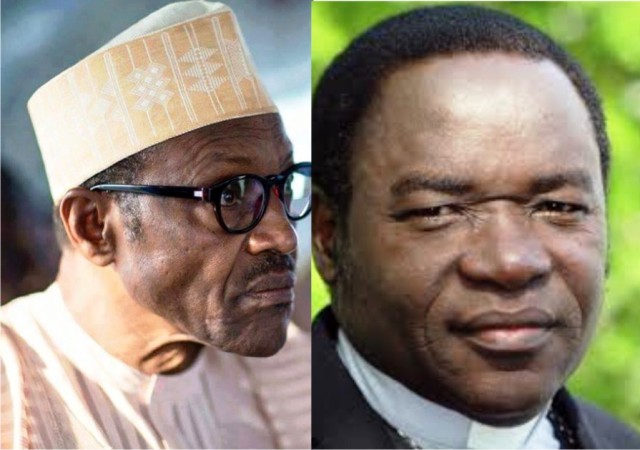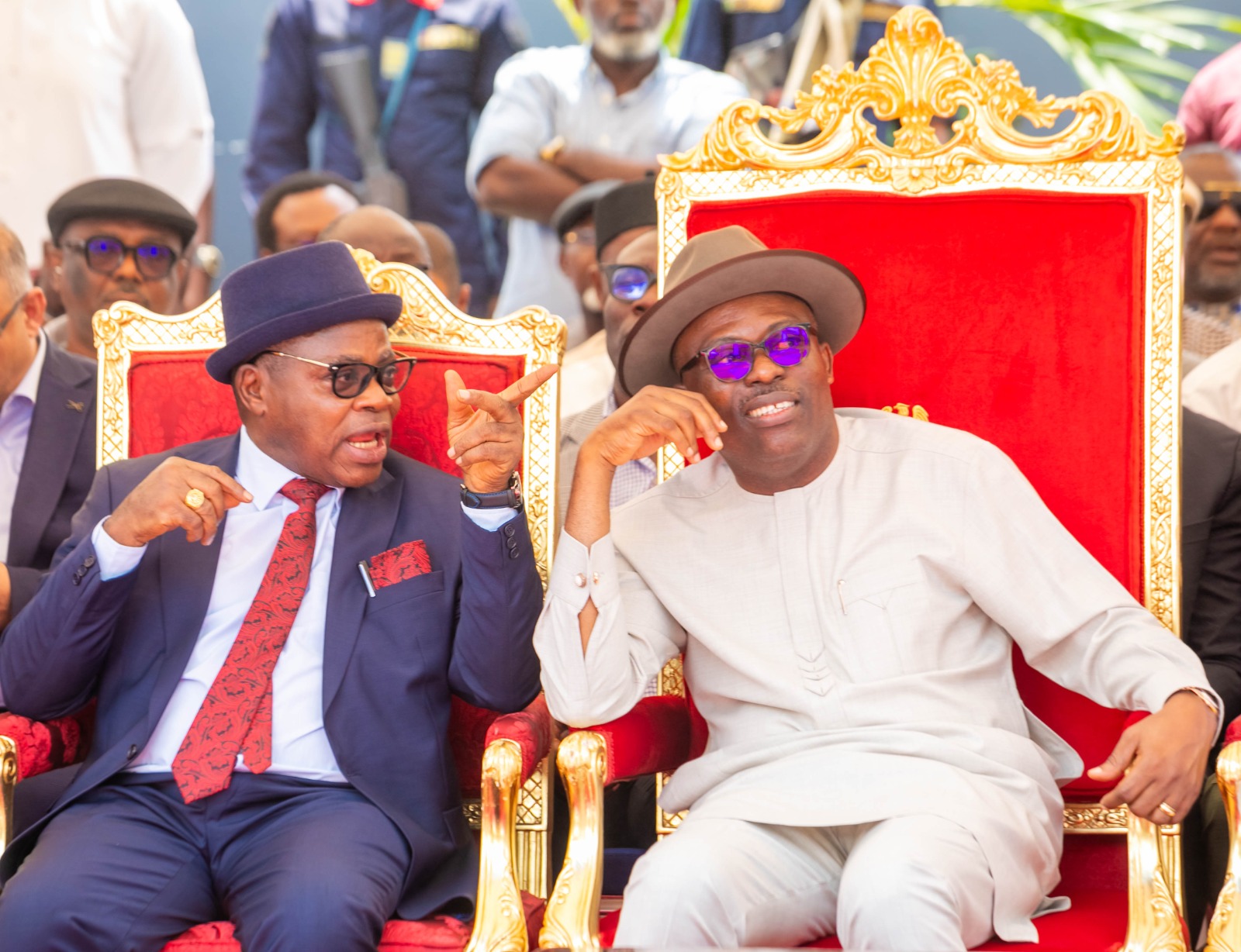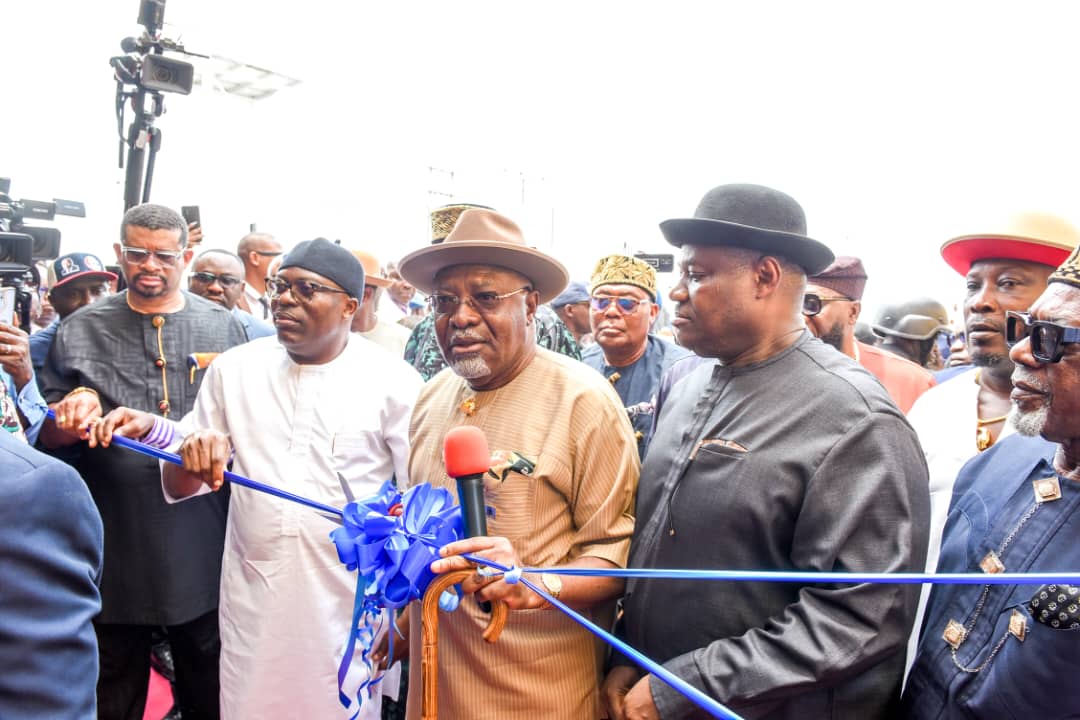Featured
Wrong Path To Change …That Caution From Bishop Kukah

For the umpteenth time, Nigerian President Muhammadu Buhari told Nigerians that he inherited nothing from the previous administration. That would mean the first few months salaries paid to federal workers upon assumption of office last year were from his pocket or that of his All Progressives Congress (APC) party.
Expanded further, it would also mean that the allocations to the Federal, States and Local Government areas also came from same source. The same may also be true, if you may, of the funding of the first few foreign trips by Mr President, where, he took the vilification of his predecessor to annoying international heights.
If the President is to be believed, it would also be trithe to conclude that the proceeds from the Nigerian Liquefied Natural Gas (NLNG) Tax holiday, by which some bail-out went to States, were not inherited from the administration of President Goodluck Ebele Jonathan.
But such was the extent of demonisation the Buhari-led APC government unleashed on a man whose political maturity saved the country from bloodbath, even disintegration. In vilifying his predecessor, Buhari did not spare the country which fluctuating fortunes he was elected to address.
What he did not consider was that due to the extent of his magnification of corruption, no sane foreign investor would deal with the Nigerian economy even with a long spoon. Those whose investments made Nigeria Africa’s largest economy even reconsidered their preferences and moved their investments elsewhere.
Where are we now? From N87 a litre which fuel sold before Buhari’s inauguration, the commodity is pegged officially at N145 and between N150 and N170 in the informal market. And with a likelihood of further hike, although government sources denied it.
This is the government of a party that promised to fix all the nation’s ailing refineries and stop the importation of refined petroleum products. That indeed is the government of a party that promised to establish new refineries.
On Monday, March 23, 2015, then APC Presidential candidate, Buhari told a rally in Owerri, ‘I’ll make Naira equal in value to the Dollar. What do we have today? More than N400 to the dollar, inflation at its all-time high and prices of goods and services beyond the reach of the common man.
With schools soon to re-open, there is the clear possibility of many students and wards remaining at home due to inability to pay fees. Civil servants are groaning just as job seekers, but nothing has changed from the lifestyle of the present administrators. In the midst of recession, wages of lawmakers and members of the Federal Executive Council remain the same.
The regular renovation of Aso Rock Villa with funds running into billions was not expunged from the 2016 budget just as the situation has not discouraged avoidable foreign trips in this time of global communication and viable embassies across the globe.
The display of vain wealth and opulence among elected and appointed federal officials has not changed. The prospensity to acquire choice automobities, neither.
Yet, the blame game continues. Virtually every failure of the administration is blamed on others except the government in power. But that was not why Nigerians voted them into power.
Yet, nearly two years into a four-year tenure, the blame game still will not abate, it gets even more fierce, sounding almost like a broken record.
That is why the recent caution by the Catholic Bishop of Sokoto, Matthew Kukah to President Buhari seems very timely. Apparently inundated with the endless complaints and blames heaped on the Jonathan administration, Kukah urged Buhari to stop complaining about the past and give fresh direction to true governance. Kukah said if the only thing Buhari would continue to do is to complain about the past, then, he has no reason heading a government.
According to the fiery Bishop, most Nigerians agreed with the Buhari-led APC that a lot was wrong that needed to be fixed and that its Presidential candidate Buhari had the magic wand to effect the needed change, which were why the party was elected, with President Buhari as armour bearer.
Buhari and his party were not elected to lament over the same problems Nigerians elected them to solve.
If what they have done, thus far, is the best they can offer- an endless blame game, with no extra effort to build the new, as Socrates enthused, then they have no business remaining in power.
Kukah is right. Nigeria is going through very challenging times. It is indeed a period when the people expect their President to speak to them from the heart, only as Buhari should, without any recourse to the demands of flowery romanticism in speech making.
The ‘Change Begins With Me’ campaign indeed offered an opportunity for the Nigerian President to pour out his soul to the people. He was expected to be original, frank, truthful and indeed empathising. He did not require enchanting prose to convince Nigerians of the need for attitudinal change.
But no thanks to Presidency’s speech writers, the President is now on the global news frontiers for the wrong reasons. Part of the speech Buhari gave to push Nigerians to jettison their old ways for new and better ones, was copied from a speech once made by US President Barack Obama.
It is called plagiarism.
This is the only flaw not yet blamed on the Jonathan administration by presidential aides. Even the campaign itself is now being said to be somebody else’s intellectual property, not credited but high-jacked. Although Information and Culture Ministry has denied the claim, the social media is awash with demeaning comments, on the subject, with a threat to weaken, the campaign’s punch.
How can such campaign succeed and usher the expected change? This is very unlike the Tunde Idiagbon-inspired War Against Indiscipline (WAI) which was made effective not by flowery speeches, but by straight-from-the heart talk and social engineering.
Now perhaps is when to remind the APC –led government that most of its promises that resulted in electoral victory remain unfulfilled. That the government has proven to be worse than its predecessor and that unless something meaningful is done to address the situation, Nigerians may, demonstrate their regrets same way they demonstrated their resolve to elect the party into power.
Interestingly, each time this suggestion is made, the government at the centre resorts to personal attacks rather than explain otherwise.
The noble path to change is not to blame all woes on others except themselves and embark on near endless vilification of others – the old. The secret of change is about building something new. Something different from the old.
That is what Nigerians are yet to see. And what Nigerians are eager to see. Continuous blames on the Jonathan administration has become a hardsell and should be done away with. And only something truly, truly positive and new can do that.
My Agony is that most of those from whom Nigerians expect change are used and recycled politicians with one true agenda – Be politically relevant and line their pockets, endlessly. No change can come from such people, because none can give what he lacks.
Soye Wilson Jamabo
Featured
We’ll Comply With Supreme Court Judgement, Fubara Assures …As CJ Inaugurates Judges’ Quarters

Rivers State Governor, Sir Siminalayi Fubara, has assured that his administration will implement, to its fullest, the recent judgment of the Supreme Court of Nigeria on the political crisis in the State.
The Governor maintained that what is important, in all of the happenings that had been witnessed, has been the protection of the interest of Rivers State because it must be above whatever personal interest that anybody could hold and canvass.
Governor Fubara gave the assurance during the inauguration of the new Judges’ Quarters, a housing facility completed by his administration for Judges indigenous to Rivers State by birth or marriage, at Old GRA, in Port Harcourt City Local Government Area, yesterday.
The Governor explained: “It has not been an easy 16 months, but what is important is the interest of our State, which must be above our personal interest. I want to say it here, very loud and clear to everyone, the Supreme Court has given a judgment, my administration is going to implement the judgment to its fullest. The reason is clear: It is not about me, it is about the good of this State.”
Governor Fubara alluded to the quantum of loss, in terms of money expended, in prosecuting the political crisis, on both sides, which has gone to waste, regrettably.
Such financial resources and other efforts, he said, would be more profitable, if they were synergised, and channeled to courses that promoted the genuine well-being and good of the State, adding that something more assuring would have been showcased.
Governor Fubara stated: “Thank God where we are today, I can assure you publicly that, any day, any time, I have not gone back on that my statement: that nothing (no price) is too big to pay for peace in this State, because at the end of the day, it is about our people. It is not about me, I will leave office but the good work that I have done will speak for me and will defend my generation.”
Commenting on the project, Governor Fubara emphasised that it further shows that his administration takes the issue of welfare, particularly of judicial officers, seriously, explaining that his administration inherited the project and with reports from the Ministry of Justice and some concerns from the Judiciary, it became imperative to continue with it.
He said, “We give glory to God that today, we have completed this project, and we are willing and ready to hand it over to the lucky judges who are going to live here so that they can perform their duties effectively.”
Governor Fubara pointed to the need for proper maintenance of the housing facility and the entire premises so that it can offer required satisfaction, maximally, and assured the Executive’s readiness to provide support in that regard.
Performing the inauguration, Chief Judge of Rivers State, Justice Simeon Amadi, recalled how he laid the foundation stone of the project, which was initiated by the immediate past administration on May 22, 2023, and thanked Governor Fubara for continuing and completing the project, which now represents another milestone and great accomplishment for the Rivers State Judiciary.
He added, “We are pleased with this landmark achievement, which represents the continuation of the policy of providing befitting residential accommodation for judges of Rivers State on owner-occupier basis or monetary ground in lieu there-off. This is backed by the Rivers State Housing Scheme for Judicial Officers Law No. 10 of 2021 passed by the Rivers State House of Assembly, and signed into law by the immediate past Governor of Rivers State.
“The Rivers State Government, in the past years, has been in the fore-front in ensuring that judges are quartered while in service, and in recent years, has gone further to allocate official quarters to judges on the basis of owner-occupier or monetary ground of a fixed sum in lieu there-off.
“The policy of providing official accommodation for judges on owner-occupier basis or monetary ground in lieu there-off has reduced greatly the pressure on judicial officers who hitherto struggle to build retirement home while in service with limited resources. Such pressure and desire to own retirement home in time past was a major concern and have its own impact on job performance”, he added.
In her address, the Solicitor-General and Permanent Secretary, Rivers State Ministry of Justice, Mrs Ibiwari Clapton-Ogolo, explained that the Rivers State Housing Scheme for Judicial Officers, Law No. 10 of 2021 established a housing scheme for judicial officers who must be indigenes of Rivers State either by birth or marriage.
Mrs Clapton-Ogolo said: “The scheme provides for ownership of a decent accommodation in the state by every judicial officer who is an indigene of Rivers State or married to an indigene of Rivers State or monetization of the accommodation, subject to the approval of the government.
“In accordance with the above law, today, the Honourable Chief Judge of Rivers State will commission seven duplexes of five bedrooms, which are exquisitely furnished. Our judges deserve nothing less. I pray that these duplexes will not just be a living houses for our judges, but homes where our judges will find peace and rest as they discharge their duties, as judges, to God and to men,” she added.
Featured
Fubara Assures Residents Of Adequate Response To Fire Outbreaks In PH …Commissions Rebranded Borokiri Fire Service Station, Vehicles

Rivers State Governor, Sir Siminalayi Fubara, has said that the Borokiri Fire Service Sub-Station in the Old Port Harcourt Township will serve as a local-level fire disaster management resource centre to provide quick response to emergencies and ensure protection of lives, property, and the environment from fire disasters.
Governor Fubara gave the assurance while inaugurating the Rivers State Fire Service, Borokiri Sub-Station in the Old Port Harcourt Township in Port Harcourt City Local Government Area, last Thursday.
The Governor stated that fire service stations are essential components of critical services that must be provided by any government for its people as proof of commitment to their safety.
Governor Fubara maintained that the inauguaration of the station, therefore, aligns with what government must do without fun-fare because discharging statutory responsibility to the citizenry is not anything to advertise.
He said: “The purpose of government is to provide services. The purpose of government is to protect lives and property. So, while we are doing those things that we are elected for, and we now start showcasing it, sometimes, it doesn’t make any sense. But, that is what the business has really turned into, which is, whatever you are doing now, you have to showcase so that they will know that you are really working.”
Governor Fubara also said: “Some persons will commission borehole, some will commission all sorts of things, and they do adverts for it. But for us, we have chosen to showcase to the world vital and most needed items of service as a government. What we are showcasing here today is one of the essentials of governance. Fire service station is a very important component in every system.”
Governor Fubara explained that some days ago, he unveiled the modernised and remodelled Headquarters of the Rivers State Fire Service to signal the restorable of stable and regular response to fire disasters across the State.
He said, three days after, he has returned to show to the world a similar word of revitalisation that has been achieved on the Borokiri Sub-Station that will end years of absence of such services available to the residents in that part of the township.
Governor Fubara stated: “Borokiri is a section of the Town, one of the densely populated areas of Port Harcourt City. The essence of rehabilitating this Fire Service Station is to cater to the huge population that is living here.
“We had cases of fire outbreak, from time to time, and we have never adequately responded to them. I strongly believe that after this minute, whatever that would happen, provided it is within the power and jurisdiction of this station, it would be combated adequately.”
Governor Fubara expressed delight over what has been achieved and made available to the people, who are also grateful, and appreciated it with gratitude, exemplified with the joy and excitement on their faces, stressing that this is the reason why his administration will remain resolute, and continue to work to better the lives of all residents in the State.
Performing the inauguaration, former Minister of Transport, Dr Abiye Sekibo, said the project reflects purposeful leadership that has prioritised the wellbeing of the people because they will get assistance to tackling fire incidences when it occurs.
He pointed to the massive rehabilitation work that has been achieved on the long abandoned fire station, which now offers the assurance of more jobs created to engage willing youths to work, adding: “Your Excellency, I was Secretary to the Government in this State, this fire station existed then. I must confess that what I am seeing today is a state-of-the-art fire station. Thank you for your care and for your love.
“This is also an opportunity to expand the possibility of work for our people. When there are instruments to work with, you need people to use them and drive these vehicles to fight the fires. I am sure that our Governor will use this, as a point of reference, to ensure that we have employment within the system that gives our youths something to do.”
Dr Sekibo also said that Governor Fubara carries the collective hope and vision of all Rivers people who are resolute and determined to continue to support him, saying that this is the more reason why President Bola Tinubu should also support Governor Fubara who, as an ally, has continued to work for the success of his administration.
Dr Sekibo also said that, for the first time in 24 years, the Ijaw Nation, which is domiciled in more than 8 local governments of Rivers State, now have the opportunity of governing the State and enjoys massive support of the people.
So far, he noted, the leadership provided by Governor Fubara has been tested in the bold decisions that he has taken to steer the progress of Rivers people, emphasising: “The work our Governor has done in this State in the short time he has been Governor, shows that he prioritizes our interest, and indeed, cares for the unity of this nation.
“This Governor, at a time when our funds are seized, he made sure that there was no problem in this State. He made sure that essential services continued, he didn’t try to create problems for the Federal Government.”
He pointed to how Rivers people have always supported the government at the centre and have not ceased, adding that under the leadership of Governor Fubara, Rivers people are still and will continue to support the President Bola Tinubu-led Federal Government.
He explained: “Mr President, the dear President of Nigeria, our own President Bola Ahmed Tinubu, we, the Rivers people, have always supported the government at the centre. We have always worked with the government at the centre. This Governor, Sir Siminalayi Fubara, has convinced Rivers people that they must stand with their President, and so, we stand with you.
“There might be persons telling you stories, especially when they see people like me, who was a core Atiku man. They will say, don’t you see, it is Atiku people that are with the Governor. There are also Atiku people that are with them there in Abuja. But, the Governor has convinced us that the place to be is to be with our President. So, Mr President, we stand with you. We stand with you because that is the right thing to do. The election delivered you as our President, and so, we stand with you. The election also delivered our Governor, our son, and we stand with him.”
Dr Sekibo advised Rivers people, who felt demoralised by the Supreme Court judgment, to brace up and give unalloyed support to Governor Fubara, who has assured of obeying the ruling to the latter.
In his speech, Rivers State Commissioner for Special Duties, Dr Samuel Anya, said the Rivers State Fire Service, Borokiri Sub-Station was abandoned for years, but quickly added that Governor Fubara has rehabilitated the structures, provided necessary materials, equipment and fire trucks to serve the people better, and guarantee their safety.
Featured
We’ve Strengthened Rivers Fire Fighting Capability – Fubara

Rivers State Governor, Sir Siminalayi Fubara, has said that the modernised fire-fighting units with new buildings, necessary machinery, materials and equipment will strengthen the emergency response capability of personnel to fire incidences in the State.
The Governor pointed to how the provision will drastically reduce, if not eliminate, the vulnerability of Rivers population to fire disasters, as according to him, there will be timely assistance to victims to reduce damage and bolster conditions for sustainable development.
Governor Fubara, who gave the assurance while inaugurating the Rivers State Fire Service Headquarters Station, located by Isaac Boro Park Flyover, in Port Harcourt City Local Government Area, yesterday, said the gesture serves as a consolidation of the promise made, in line with his vision of governance: to provide quality service to the good people of Rivers State.
He explained that some years ago, the State was at the mercy of the multi-nationals that had functional fire trucks to respond to most fire incidences, and pointed to setbacks that greeted some emergencies, adding that the records of losses to fire incidences were colossal.
Governor Fubara said: “We lost the Mile One Market because we couldn’t respond adequately. We lost, even what we call, the Fruit Garden Market because we could not respond. Are we talking about houses, lives that have been lost in this State because of inadequate fire service?”
The Governor insisted that the purpose of governance is to provide such quality social services, protect lives and property, and make living comfortable for the people, asserting that his administration has not failed in those regards, and has continued to intensify the provision of services that have made Rivers people happy.
He said, “And, what we are doing today is to tell the good people of Rivers State, and to showcase to the world, that there is governance in this State. Not governance for the sake of governance, but governance that is purpose-driven, governance that is interested in projects that will change the lives of our people.
“Some days ago, a tanker fell along the Woji-Elelenwo Road. If it were before, lives would have been lost. But immediately, the fire service, not the multi-nationals, it was the Rivers State Fire Service that responded and arrested the situation. What else are we talking about?”
Governor Fubara said Rivers people are very happy with the consistent delivery of infrastructure projects that address the critical problems experienced by the people in the larger society, emphasising that he believed strongly that even if some persons are indulged in clandestine activities, and determined to discredit his administration, Rivers people are happy, indisputably so.
He explained, “We are not interested whether those people who are commissioned to undermine us are unhappy, that is not our business. Our business is about Rivers State and Rivers people. So, like the Commissioner said, we did not just do this for the sake of glamour. You come here, you see a painted house, every facility that is required in a well-built fire fighting facility, is all in this place.”
Governor Fubara said further: “You can image a government that has a fire service and the firemen are not working. It is only at the end of the month you pay them their salaries. You can see that they were not happy and unproductive. But today, they are happy because they have a big responsibility now ahead of them: to ensure that lives and property of the good people of Rivers State are adequately protected. So, I want to thank you for this particular spirit at this moment.”
Governor Fubara commended the Commissioner for Special Duties, Dr Sam Anya, for driving the process to conclusion, and the contractor for delivering the project on schedule, and assured that his administration will continue to ensure the protection of lives and property while defending the Constitution of the Federal Republic of Nigeria.
Governor Fubara also told Rivers people to expect the provision of more basic amenities, unbiasedly, and advised those in charge of the firefighting equipment to safeguard and protect them so that they can serve their purpose maximally.
Providing the project description, Rivers State Commissioner for Special Duties, Dr Samuel Anya, explained that since the first fire service station was built in the 1960s, this was the first time the facility is being remodeled and upgraded, emphasising that certain features were introduced and added to make the station comparable to fire service stations nationally.
He stated: “We have gym, sick-bay, offices and state-of-the-art equipment that we will use to combat fire. Your Excellency, we have also, new fire trucks that you have acquired. Before now, we did not have any truck, and when incidents happen, we have to call the Federal Fire Service or call Agip or Shell Fire Service. But thank God that His Excellency, in his wisdom, has given us state-of-the-art facility, and we don’t need to call any other person again.”
In his address, Head of Local Government Administration, Port Harcourt City Local Government Area, Mr. Clifford Paul, said Governor Fubara has turned the once dilapidated fire service station and its equipment into a modern masterpiece, which represents a significant milestone in the collective commitment towards tackling fire incidences.
Mr Paul stated that it will certainly enhance the capacity of personnel and reinforce their preparedness to respond to emergencies in the event of fire outbreaks.
-

 Niger Delta3 days ago
Niger Delta3 days agoNACA Debunks Fake HIV Drug Pricing News
-
Business3 days ago
MDAs, Presidency Spend N1.9bn On Trips, Trainings In France
-
News3 days ago
EFCC Exposes 58 Ponzi Schemes Targeting Nigerians
-
Politics3 days ago
You’re Democratic Accountability Agents, Diri Tells Journalists
-
Niger Delta3 days ago
Diri Rejects S’South PDP Congress … Calls For Unity
-
Business3 days ago
Coy Launches $2m Fund For Nigerian Entrepreneurs
-
Sports3 days ago
RFF Announces 15 Players For African Games
-
News3 days ago
We’re Donating Helicopter To NAF To Enhance Nigeria’s Security, Economic Rebound – Fubara

